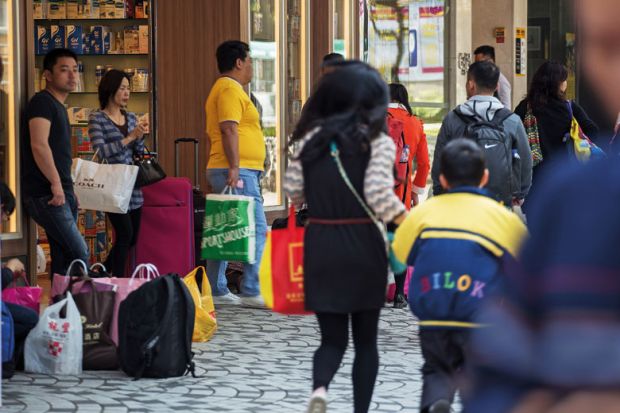Rising political tensions in Hong Kong are spilling over on to campuses as mainland Chinese students say they experience discrimination and heated clashes over politics while studying in the city.
Over the past decade, Hong Kong universities have become increasingly reliant on mainland Chinese students, but a new study found that some visitors now perceive the city to be “more foreign than a foreign country”.
Focus groups of more than 50 mainland Chinese students from four universities reported unfriendly treatment by shopkeepers and traders when they could not speak Cantonese, the language spoken in Hong Kong and parts of southern China.
“Once my mom came to Hong Kong to visit me, and we went shopping together,” reported one mainland student. “At that time, I could not speak any Cantonese, so I just used Putonghua [the standard Chinese used in most of the country] with the salesperson in the shopping mall. To my surprise, no sooner had I finished my words than she turned away.”
The students appear to be caught up in increasing hostility towards mainlanders in Hong Kong: last year, local protesters shouted “go home!” at mainland shoppers who they claimed were buying up tax-free goods and pushing up rents and prices.
There are also deeper political tensions, with fears that Beijing is seizing greater control over the nominally self-governing city. Calls for greater democracy – and a growing sense of an independent Hong Kong identity – were factors behind the so-called Umbrella Movement protests in 2014, and earlier in September a handful of activists demanding greater autonomy were elected to the territory’s Legislative Council.
Entering this “highly politicalized city”, mainland students ended up clashing with Hongkongers, the study found.
“When I was on the mainland, I was taught that Hong Kong was part of China. However, in Hong Kong…local students usually use 'China' instead of 'mainland China',” said one student from the mainland. “For me, this is unacceptable because Hong Kong is an inalienable part of China, so I would argue with them when they say so.”
However, as mainland students stayed for longer in the city, “some of them start to appreciate or empathize with what Hongkongers have been fighting for in social movements”, according to the study, ‘‘'It’s more foreign than a foreign country’: adaptation and experience of Mainland Chinese students in Hong Kong", published in Tertiary Education and Management.
Between 2004-05 and 2014-15, the number of mainland students in Hong Kong has tripled to 11,548, and the group now makes up the biggest group after locals. However, in 2015 – the first year after the Umbrella Movement protests – mainland applicants to Hong Kong universities were reported to have fallen, with pro-Beijing newspapers blaming politically hostile campuses.
To avoid further antagonism, the study suggests that Hong Kong universities expand the length of their Cantonese courses to at least two semesters and offer “intercultural communication workshops” to bridge a political and social divide.
Meanwhile, mainland students could treat the Cantonese language with more respect and also “take consideration of the perspectives of locals and respect differences", it adds.
Register to continue
Why register?
- Registration is free and only takes a moment
- Once registered, you can read 3 articles a month
- Sign up for our newsletter
Subscribe
Or subscribe for unlimited access to:
- Unlimited access to news, views, insights & reviews
- Digital editions
- Digital access to THE’s university and college rankings analysis
Already registered or a current subscriber? Login





